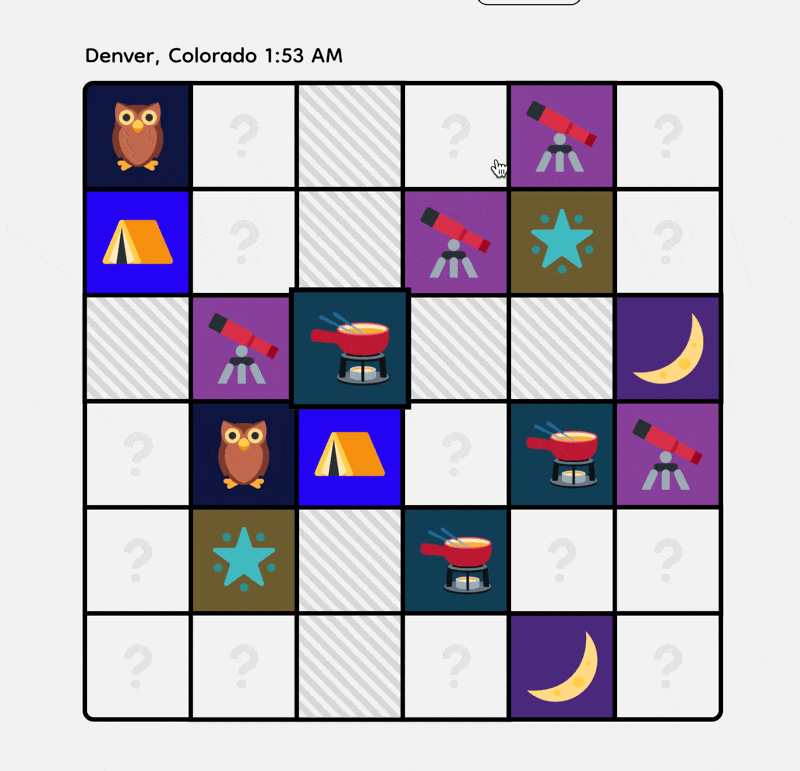Memory Games Can Be Surprisingly Fun
A slate of recent games that play with memorization introduce fun in unexpected places
I spent way more time on Pairs and Perils than I expected.
Pairs and Perils, a game by Little Horror Studios and published this year, roughly is what happens if you mashup Concentration with Slay the Spire. Instead of building a big deck of cards, you have a small deck that gets dealt out in pairs, concentration style.
Each round you get dealt out 10 cards in your deck (5 pairs), and you have to remember which cards match with each other in addition to avoiding trap cards that are also dealt. The idea is that you're supposed to remember which cards you want to aim at which enemies.
This, mostly, was not my experience. I did my best to simply remember which cards ended up where, slowly lost my grasp on the reality of the game as cards were added to the deck, and ended up hanging on for dear life by the end of each game.
I kinda love it?
The game has two mechanics which basically don't functionally work with each other. The point of a deck is to refine it, by adding and removing cards over time you can shape how you play. And the point of memory is to basically use those linkages between cards and references to do something. This is a game about operating the system, for me anyway.
If Pairs and Perils was a game I wanted to master. If I wanted to climb the difficult level and get better at it, I think I would hate it.
Is Pairs and Perils a good game? The cynic in me would love to say no. I feel minimal desire to master or understand the system and the compulsion for any given loop is fairly minimal. The typical space for games like this is “toyetic”, or an experience which has enough interactive elements that feels delightful. And while I think the game has some of that, it’s not blowing my socks off, or something.
None of this is a critique of the game. It’s an observation that the typical ideas of what “make a good game” are a fairly narrow path defined by the sorts of mastery habits and experiences that we generally know to be pleasing to play around with. Pairs and Perils doesn’t have many of those (for me anyway) and still succeeds.
Memorization Doesn’t Feel Like Other Skill Development
I know how to memorize things. Spaced Repetition is a fabulously excellent system for memorizing. I do not know how I memorize things though. Not a clue. This is decidedly different, and weirder, for me than other things. When I learned how to throw a baseball, I could feel the different ways my shoulder moved. I could test out arm slots (the angle I threw a baseball at) and grips, and come to an understanding of how my body worked through playing. I was developing skill.
I do not actually know how to make my memory better. I know how to commit things to memory in the same sort of way that a magician might know a series of incantations to execute a spell. And I would suspect that the act of memorizing things probably improves my memory generally. But these are not the same things. I do not feel my memory getting better. I just enjoy the results.
So, as a memory game, Pairs and Perils is a game I enjoy operating, like I think most memory games are. I really enjoy that runs are quick. I enjoy derping around with the different character abilities, even though most of the time I forget to use them because my brain is intently focused on trying to burn those things into memory. If it were any longer, if there were more cards I think my tenuous relationship with it would disappear into something more akin to rage and disappointment, because in all likelihood this game would just be reminding me about my own fragile mortality.
And I think that's why the memory games that have come out recently focus so much on the experience around memory more than the experience within it. There are plenty of ways memorization pops up in other games and players, for the most part, view it with distrust and not a skillful element of play. Things like memorizing Chess or Scrabble openings, counting cards, or memorizing collectible cards so we can predict or prepare for an opponent's play. But these sorts of memorization (outside of maybe counting cards?) feel like imprinting. They're a side effect of playing the game, something that will just magically happen. Every time I've tried to get a group to play Wilmot's Warehouse (the board game), I have to start with "Ok so this is a memory game but I promise it's so so so good you're gonna love it", because people hate memory games.
10 Games to enjoy the holidays with friends and family
Is there any better feeling than picking the right game to play? Sussing out the right vibe that you think people willing to learn. The uncertainty teaching them the rules and the wait to see the verdict.
The Wilmot's Warehouse board game is about crafting stories and basically doing a magic trick on yourself and your friends via mental connections. The video game (the first one) is similarly about trying to create logical groupings, but the fact that you're moving around all the time (and the story) kinda cleverly hides that all from you, and Weather Memoku uses Sudoku as this clever backstop to turn an otherwise infuriating game of concentration into a deduction puzzle where you can use your memory to go fast if you want to a beat a time.
Operating Games is Fun, Actually
Indie games, strategy indie games especially, really seem to be built around this idea that mastery should be the primary goal of all gameplay. The point is to get better at the game while you play the game, and build mastery.
And... that's great. In general, I like getting better at the games I play. But that might be something I focus on for 1, maybe 2 games a year. A lot of the other games I play, even the strategy games, I'm looking for something different. It's not that I don't want a challenge, it's that my relationship to the challenge is way looser. I want to get better, but I also just want to enjoy moving things around and moving the story along.





